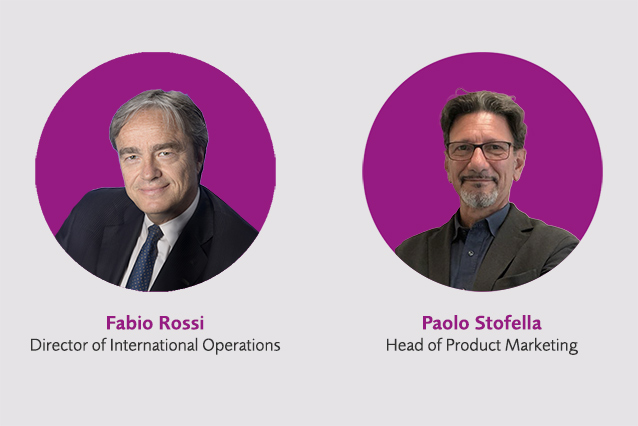
Gpi has introduced the Gpi4Med Suite, the Global Suite of Medical Grade Software Products for all Diagnostic Services, Critical Care and Telemedicine.
We discuss this with Fabio Rossi, Director of International Operations, and Paolo Stofella, Head of Product Marketing.
Gpi recently introduced the Gpi4Med Suite at MedLab in Dubai. It’s a collection of six vertical product lines designed for the global market. This is a significant development, but why is it so important at this time?
Fabio Rossi – We believe that the market is experiencing worldwide a favorable moment to introduce solutions from the Gpi4Med Suite family. We are talking about the Blood solutions for management of blood’s supply chain, for Diagnostics (LIS, Digital Path, and Imaging), Critical Care, and Patient Monitoring, all systems on which the market is preparing to make significant investments. All the solutions are supported by Artificial Intelligence functions, we believe it is the right time to introduce this essential technology to support the work of healthcare staff.
For Gpi, what market opportunities open up with the new Suite?
Fabio Rossi – For Gpi, it’s time to consolidate its presence in the market with innovative and recognizable technologies that can bring added value. We are undergoing a process that will enhance our competitiveness from the outset, particularly in international markets. The Suite allows us to integrate Gpi’s strong vertical expertise in this area with the broader context in which they are placed. Both in terms of software and medical devices, ready to manage effectively the activities of diagnosing and treating patients.
Specifically, what technologies are we talking about? Will integrating them into a Suite increase their effectiveness?
Paolo Stofella – Two key aspects provide an unprecedented level of efficacy.
Firstly, all Hospitals face a significant complexity on the integration of different software vendors solutions, especially in the areas of diagnostic, blood and critical care applications. Typically, hospitals need to harmonize the integration of many different vendors solutions in Blood, Laboratory, Imaging, Pathology and Critical Care, implying costs for hospital IT staff and delays in detecting and solving problems. GPI4Med, encompassing all these applications in a unique suite is reducing project and ownership costs, as well as improving reliability.
Secondly, the suite integrates with all medical devices in a hospital, including analytical and blood instruments, dicom and non dicom imaging sources, pathology instruments, such as WSI stainers and scanners, and anesthesia, operating theatres and ICU devices. Such a coverage from a single vendor is unique in the market and allows GPI to acquire, manage and share with healthcare professionals all the patient information produced by medical devices, with significant gains in terms of integration, optimization, costs savings and extensive control.
The Gpi4Med Suite has high quality standard and recognized certifications. In concrete terms, what are the advantages of this approach?
Paolo Stofella – All the products in the suite are FDA cleared and/or CE/MDR certified in the appropriate classes depending on the specific field of application. The software factories are ISO 13485 Medical Device certified.
Strong and highly controlled methodologies are applied to software development, ensuring thorough testing procedures and control for each single release.
In addition, clinical risk analysis, evaluation and mitigation is applied to all software packages, following consolidated standard methodologies. Post market surveillance is also applied, including software behavior constant monitoring, software installation tracking and and permanent scientific advances monitoring.
In summary, such certifications ensure better patient safety, better software quality and reliability, constant product evolutions based on market, technology and science monitoring.
Let’s broaden our perspective again: within this market, what are the emerging trends to focus on? What role will Gpi play in these developments in the global context?
Fabio Rossi – Global healthcare is undergoing deep changes to ensure services with high quality levels at contained costs: cloud solutions to ensure a lower Total Cost of Ownership (TCO); promoting mergers and the integration of multiple healthcare organizations, supporting home care through appropriate technologies and services, also to address drastic and sudden changes. A clear example is the scenario generated by the recent health emergency.
In this context, GPI’s strategy is introduced: to provide cloud solutions through vertical applications, integrated with the broader healthcare context and capable of safeguarding the investments made by our clients; supporting market trends and new health demands, allowing, thanks to suitable technologies, the care of chronic patients also outside of hospitals.
